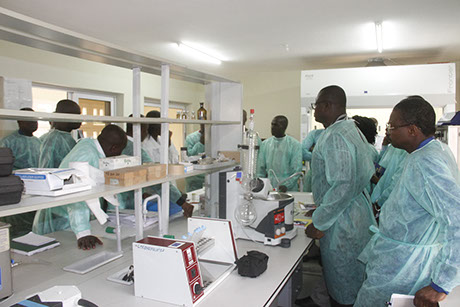Crime prevention and detection are among the major challenges facing the Ghana Police Service (GPS) in Ghana. The GPS has a staff strength of about 25,000 officers as of 2021.
To address these challenges, the GPS has over the years been adopting various technologies to enhance its operations and improve public safety.
Here’s a breakdown of some of these technologies that the GPS is currently employing in its operations:
The e-Police Project
In 2017, the GPS piloted an e-policing service within the Accra and Tema policing regions to help improve efficiency and daily monitoring.
The project was developed by Vas-intel, Stratum, and the University of Ghana.
It was piloted in 26 stations and districts within the Accra and Tema regions with devices capturing the fingerprints and photographs of suspects.
The service would allow investigators to generate crime reports and related data which could be reviewed by the IGP and other police officers.
It was stated that the pilot would run alongside existing traditional methods until the old system is finally phased out with the service expected to be rolled out nationwide by 2020 to improve efficiency and daily monitoring.
Currently, the project doesn’t appear to be in function.
The CCTV and Traffic Surveillance System
The CCTV system is a network of cameras installed in strategic locations across the city to capture and transmit live images of criminal activities to a central command center.
Recently, GPS introduced its Traffitech GH project, which is to automate road traffic law enforcement and improve road safety in Ghana.
The Automated Fingerprint Identification System (AFIS)
An automated fingerprint identification system (AFIS) was implemented in September 2011 at the GPS’s Criminal Data Services Bureau.
The system currently has over 3,700 fingerprints and related records have been captured in the AFIS system. In addition, records of convicts dating back to 1986 have been captured in the Criminal Records Database System.
The DNA Forensic Laboratory
The Forensic Science Laboratory (FSL) of the Ghana Police Service was established in 1948 to provide scientific support to criminal investigations. It is the only Forensic Laboratory for the Ghana Police Service and as such caters to all ten regions in Ghana.

It was refurbished in 2011 with €3 Million Euros support from the European Union under the EU-Ghana Police Project.
The facility analyzes biological evidence such as blood, saliva, hair, and semen to identify perpetrators and victims of crimes. The laboratory also helps the GPS to establish paternity, kinship, and identity in civil cases.
The Body Camera Project
In 2017, the GPS received its first set of police body cameras. These body cameras would record police activities and the videos would be transmitted to the head office for monitoring.
The service received 250 body cameras and expected 3000 cameras to be delivered by the end of 2017.
According to news reports, about 150 body cameras are being used by personnel of the Visibility Unit of the service in Accra to enhance investigations.
Challenges
Even with all the acquired technology, the GPS still faces challenges including:
- High cost of acquiring and maintaining these technologies
- Lack of adequate training and skills for the police officers to use these technologies and
- and legal and ethical issues surrounding the use of these technologies, such as privacy, data protection, and human rights.
Catch up on news and other tidbits on our WhatsApp Community Page, Twitter/X, and subscribe to our weekly newsletter to ensure you don’t miss out on any news.










